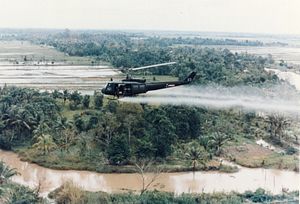Vietnam’s Professor Vo Quy has passed away in Hanoi at age 87. The well-known and well-loved zoologist had a storied career that spanned decades and, even in his 80s, he was still working and busy, as passionate as ever.
I met Professor Vo Quy in Hanoi late last decade, when he was in his late 70s. It was the middle of a bitter North Vietnamese winter and his office was so cold our breath came out in clouds. He worked in an old building, part of the Hanoi National University, with tiled floors and heavy wooden furniture.
Bundled up in an enormous padded black parka, like a Michelin man using rubbish bags, he was as cheery as anything, offering me tea and a surprisingly long and comprehensive interview.
Vo Quy had worked for years on Agent Orange-related issues. He began entering the forests where the United States had dropped the toxic defoliant in the 1960s and 1970s. “It was like the moon!” he recalled, noting how only days after Agent Orange was emitted, the forest had died, leaving a creepy dead-tree scape and nothing living, even on the ground.
Did he worry about being so close to so much of the dioxin-laced chemical? No, he hadn’t known then exactly what it was. Did he worry now, that he’d get cancer or some other disease? No, not really.
He also said something else interesting, which has not ever made it into the wider public or press reports. There was, he said, a direct link between the serious flooding in the central areas of Vietnam during storm season and Agent Orange. As climate change worsened the storms that blew from the Philippines across the South China Sea to the central coast in the second half of the year, the effects were worse as the old ground and tree cover no longer helped hold back the floods or mudslides.
Quy was an zoologist and ornithologist who studied birds during the American War and published his first book on Vietnam’s birds in 1975. Time Magazine named him a Hero of the Environment in 2008 for his work designating Vietnam’s national parks (the first of which was named in 1962) and his work in Agent Orange remediation, which focused more on the environmental impact than the trickier and more contentious human impact.
Quy had his own television show and was a certain kind of a celebrity. He also had connections at the highest level. The New York Times’ Mike Ives reported that “Dr. Quy’s influence on Vietnamese environmental policy was partly a product of his connections in the ruling Communist Party. His closest political ally was Gen. Vo Nguyen Giap.”
However unlike Giap, who in his later years spoke out against bauxite mines in the Central Highlands, Quy never became a strident activist. He was an advocate with influence within the structure, not an agitator without it.
2016 was the year when environmental activism in Vietnam went mainstream. The Formosa fish kill scandal that left some 100 tonnes of fish dead along Vietnam’s central coast galvanized a citizenry that seemed inured to environmental problems. Thousands protested the Taiwanese steel mill’s pollution in the major cities. Ordinary people, rather than simply skilled activists, had begun to care about their food and air quality, as well as the impact on fishermen and others from ongoing environmental damage. Vo Quy did not add his voice to that chorus but may still have take some comfort. He told Time in 2008, “I try to tell the younger generation that we must conserve nature… But young people today like to make money more than taking care of forests.”
Many have now discovered they can do both. The cheerful old scientist, who walked through Agent Orange’s bitter moonscapes without a worry for himself, may be proud.

































